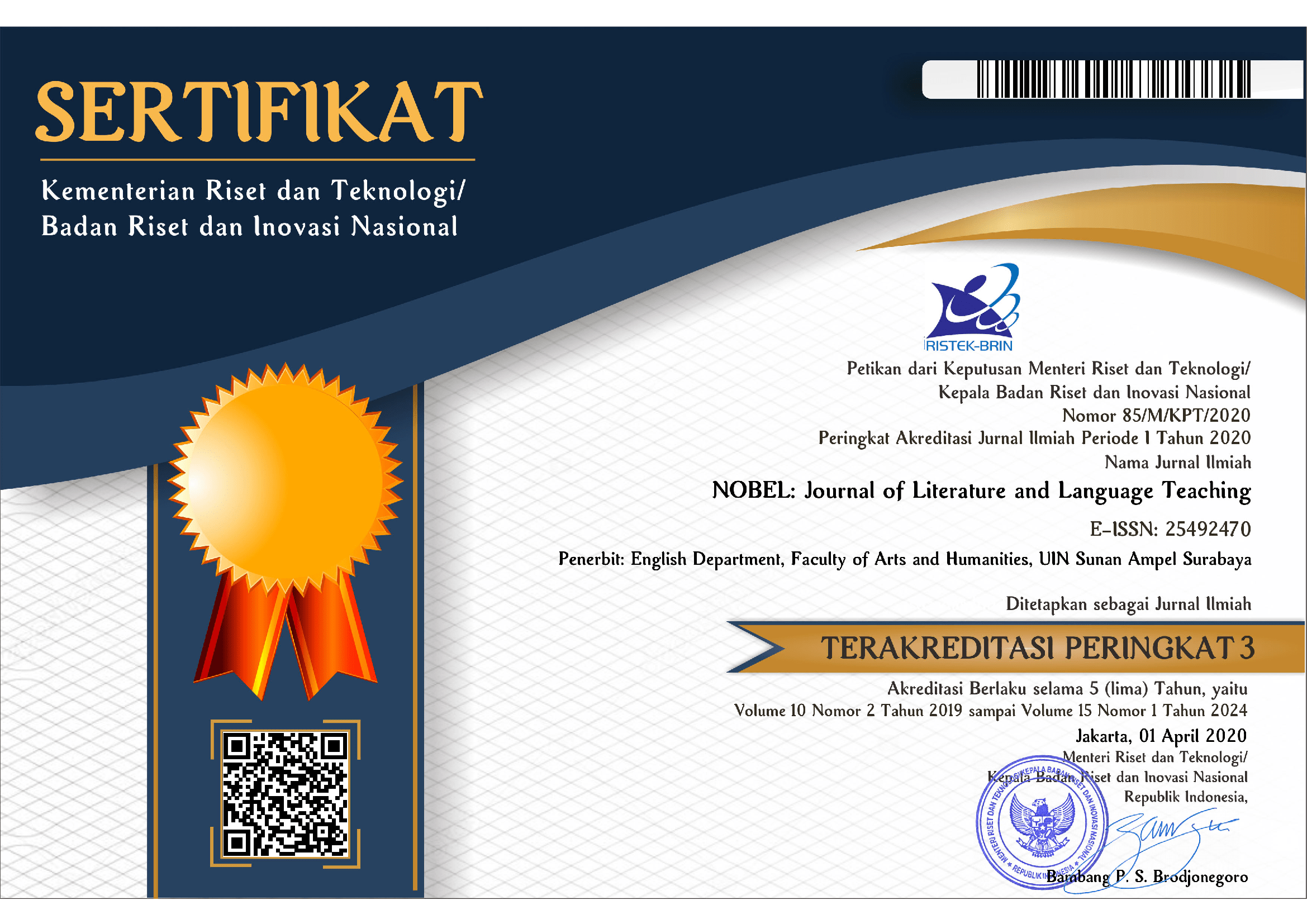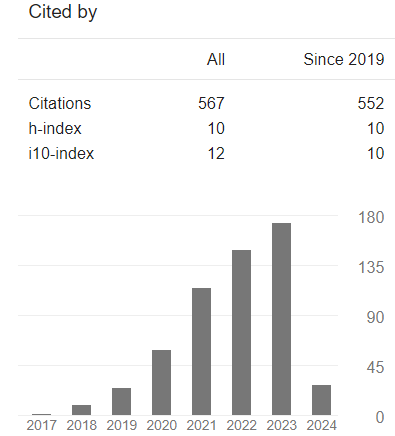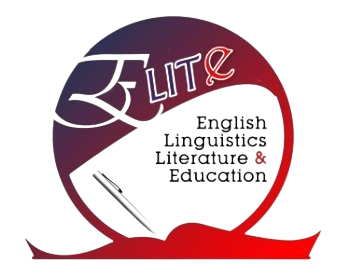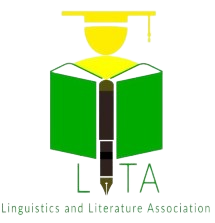"I Am Aware, but Who Am I to Comment.": Critical Stance in Indonesian EFL Students' Academic Essay
DOI:
https://doi.org/10.15642/NOBEL.2022.13.2.210-230Keywords:
reporting verbs, tenses of RV, academic essay, critical stanceAbstract
The study examined the reporting verbs (RV) and tenses of RV in the academic essay of English-majored undergraduate students in Indonesia. Employing a sequential explanatory mixed-method research design, the study first collected quantitative data in the form of frequency of RV using Hyland’s (2002) framework and tenses of RV using Thomas and Hawes’ (1997) framework. Qualitative data were then collected to explain the reasons behind the use of RV and the tenses of RV. The study found that discourse verbs are prevalent in the students’ essays, with 66,67% occurrence of total corpus, followed by research verbs, with 30,72% occurrence of the total corpus. Cognition verbs, however, were the least used, with 2,61% of the total corpus. The study also found that present tense (58,82%) and past tense (41,18%) were the most frequently used tenses in students’ RV. The interview revealed students’ reasons behind the frequent use of discourse and research verbs and the limited use of cognition verbs in their essays. Among which are their lack of engagement with literature and reticence to evaluate the author’s claims due to their inadequate cognitive competence and English proficiency. The study concludes that students’ use of discourse and research verbs reflects their relatively low criticality toward the cited materials.
Downloads
References
Agbaglo, E. (2017). The types and the frequencies of reporting verbs in research articles written by lecturers in a Ghanaian university. Journal of Literature, Languages and Linguistics, 34, 51–57. https://core.ac.uk/reader/234693400
Amrullah, Q. L., Munir, A., & Suharsono, S. (2017). Rhetorical functions of reporting verbs in author prominent citations of graduate students’ research papers. Journal of English Language and Literature, 8(3), 690–700. https://doi.org/10.17722/jell.v8i3.279
Anthony, L. (2004). AntConc: A learner and classroom friendly, multi-platform corpus analysis toolkit. In L. Anthony, S. Fujita, & Y. Harada (Eds.), IWLeL 2004: An Interactive Workshop on Language e-Learning (pp. 7–13). Waseda University.
Arsyad, S., Syahrial, S., & Hakim, H. (2021). Citing others’ works in academic texts: How non-native writers of English across-disciplines use reporting verbs and reporting signals in their research article introductions. Jurnal Arbitrer, 8(1), 59–71. https://doi.org/10.25077/ar.8.1.59-71.2021
Bitchener, J. (2010). Writing an applied linguistics thesis or dissertation: A guide to presenting empirical research. Palgrave Macmillan.
Bloch, J. (2010). A cooncordance-based study of the use of reporting verbs as rhetorical devices in academic papers. Journal of Writing Research, 2(2), 219–244. https://doi.org/10.17239/jowr-2010.02.02.7
Charles, M. (2006a). The construction of stance in reporting clauses: A cross-disciplinary study of theses. Applied Linguistics, 27(3), 492–518.
https://doi.org/10.1093/applin/aml021
Charles, M. (2006b). Phraseological patterns in reporting clauses used in citation: A corpus-based study of theses in two disciplines. English for Specific Purposes, 25(3), 310–331. https://doi.org/10.1016/J.ESP.2005.05.003
Davis, M. (2013). The development of source use by international postgraduate students. Journal of English for Academic Purposes, 12(2), 125–135. https://doi.org/10.1016/j.jeap.2012.11.008
Harwood, N. (2008). Citers’ use of citees’ names: Findings from a qualitative interview-based study. Journal of the American Society for Information Science and Technology, 59(6), 1007–1011. https://doi.org/10.1002/asi.20789
Hyland, K. (1999). Academic attribution: Citation and the construction of disciplinary knowledge. Applied Linguistics, 20(3), 341–367. https://doi.org/10.1093/applin/20.3.341
Hyland, K. (2002). Activity and evaluation: Reporting practices in academic writing. In J. Flowerdew (Ed.), Academic discourse (pp. 115–130). Longman.
Hyland, K. (2004). Disciplinary discourses: Social interactions in academic writing. The University of Michigan Press. https://doi.org/10.2307/3587657
Ivankova, N. V., Creswell, J. W., & Stick, S. L. (2016). Using mixed-methods sequential explanatory design: From theory to practice: Field Methods, 18(1), 3–20. https://doi.org/10.1177/1525822X05282260
Jafarigohar, M., & Mohammadkhani, A. (2015). Reporting verbs in applied linguistics research articles by native and non-native writers. Theory and Practice in Language Studies, 5(12), 2490–2496. https://doi.org/10.17507/tpls.0512.08
Jarkovská, M., & Kučírková, L. (2020). Citation practices in EFL academic writing: The use of reporting verbs in Master’s thesis literature reviews. Indonesian Journal of Applied Linguistics, 10(2), 571–579. https://doi.org/10.17509/ijal.v10i2.29033
Jaroongkhongdach, W. (2015). Idea sharing: Reporting verbs in research writing: Lessons from experts. PASAA, 50, 143–154. https://files.eric.ed.gov/fulltext/EJ1088306.pdf
Jogthong, C. (2001). Research article introductions in Thai: genre analysis of academic writing. West Virginia University.
Juliaty, H., & Abetnego, D. (2019). A preliminary study on EFL students’ grammatical competence in descriptive writing task. Journal of Language and Literature, 19(1), 90–100. https://doi.org/10.24071/joll.2019.190109
Kanoksilapatham, B. (2005). Rhetorical structure of biochemistry research articles. English for Specific Purposes, 24(3), 269–292. https://doi.org/10.1016/J.ESP.2004.08.003
Kwon, M. H., Staples, S., & Partridge, R. S. (2018). Source work in the first-year L2 writing classroom: Undergraduate L2 writers’ use of reporting verbs. Journal of English for Academic Purposes, 34, 86–96. https://doi.org/10.1016/j.jeap.2018.04.001
Lebedinski, L., & Vandenberghe, V. (2014). Assessing education’s contribution to productivity using firm-level evidence. International Journal of Manpower, 35(8), 1116–1139. https://doi.org/10.1108/IJM-06-2012-0090/FULL/XML
Lee, J. J., Hitchcock, C., & Elliott Casal, J. (2018). Citation practices of L2 university students in first-year writing: Form, function, and stance. Journal of English for Academic Purposes, 33, 1–11. https://doi.org/10.1016/J.JEAP.2018.01.001
Liardét, C. L., & Black, S. (2019). “So and so” says, states and argues: A corpus-assisted engagement analysis of reporting verbs. Journal of Second Language Writing, 44, 37–50. https://doi.org/10.1016/j.jslw.2019.02.001
Loan, N. T. T., & Pramoolsook, I. (2015). Reporting verbs in literature review chapters of TESOL master’s theses written by Vietnamese postgraduates. ESP Today, 3(2), 196–215. https://www.esptodayjournal.org/pdf/current_issue/8.12.2015/NGUYEN_THI_THUY_LOAN&ISSRA_PRAMOOLSOOK-full-text.pdf
Luzón, M.J. (2018). Variation in academic writing practices: The case of reporting verbs in English-medium research articles. Iberica, 36(2018), 171–194. https://zaguan.unizar.es/record/75998
Manan, N. A., & Noor, N. M. (2014). Analysis of reporting verbs in Master’s theses. Procedia - Social and Behavioral Sciences, 134, 140–145. https://doi.org/10.1016/j.sbspro.2014.04.232
Miles, M. B., Huberman, A. M., & Saldana, J. (2019). Qualitative data analysis: A methods sourcebook (4th ed.). Sage.
Pecorari, D. (2008). Academic writing and plagiarism: A linguistic analysis. Continuum.
Ramoroka, B. T. (2014). Integration of sources in academic writing: A corpus-based study of citation practices in essay writing in two departments at the University of Botswana. Reading & Writing, 5(1), 1–7. https://doi.org/10.4102/RW.V5I1.41
Rochman, S. (2003). Indonesian students misconception in using present perfect tense to write composition. CELT, 3(2), 95–104. http://103.243.177.137/index.php/celt/article/viewFile/1088/742
Salager-Meyer, F. (1992). A text-type and move analysis study of verb tense and modality distribution in medical English abstracts. English for Specific Purposes, 11(2), 93–113. https://doi.org/10.1016/S0889-4906(05)80002-X
Soler Monreal, C., & Gil Salom, L. (2011). A cross-language study on citation practice in PhD theses. International Journal of English Studies, 11(2), 53–73. https://doi.org/10.6018/ijes/2011/2/149641
Suhandoko, & Ningrum, D. R. (2020). A corpus-based list of academic English derivational suffixes. Indonesian Journal of Applied Linguistics, 10(2), 481–490. https://doi.org/10.17509/ijal.v10i2.28589
Swales, J. M. (1990). Genre analysis: English in academic and research settings. Cambridge University Press.
Swales, J. M., & Feak, C. B. (2012). Academic writing for graduate students: Essential tasks and skills (3rd ed.). University of Michigan Press.
Thomas, S., & Hawes, T. (1997). Tense choices in citations. Research in the Teaching of English, 31(3), 393–414. https://www.jstor.org/stable/40171561
Thompson, G., & Yiyun, Y. (1991). Evaluation in the reporting verbs used in academic papers. Applied Linguistics, 12(4), 365–382. https://doi.org/10.1093/APPLIN/12.4.365
Uba, S. Y. (2019). Semantic categories of reporting verbs across four disciplines in research articles. English Language Teaching, 13(1), 89–98. https://doi.org/10.5539/elt.v13n1p89
Wen, S., & Pramoolsook, I. (2021). A comparative study of reporting verbs used in the Introduction chapters of bachelor’s theses and master’s theses by Chinese English-majored students. Indonesian Journal of Applied Linguistics, 11(2), 452–462. https://doi.org/10.17509/ijal.v11i2.32748
Willett, P. (2013). Readers’ perceptions of authors’ citation behaviour. Journal of Documentation, 69(1), 145–156. https://doi.org/10.1108/00220411311295360
Yeganeh, M. T., & Boghayeri, M. (2015). The frequency and function of reporting verbs in research articles written by native Persian and English speakers. Procedia - Social and Behavioral Sciences, 192, 582–586. https://doi.org/10.1016/j.sbspro.2015.06.097
Downloads
Published
How to Cite
Issue
Section
License
Copyright (c) 2022 NOBEL: Journal of Literature and Language Teaching

This work is licensed under a Creative Commons Attribution 4.0 International License.







